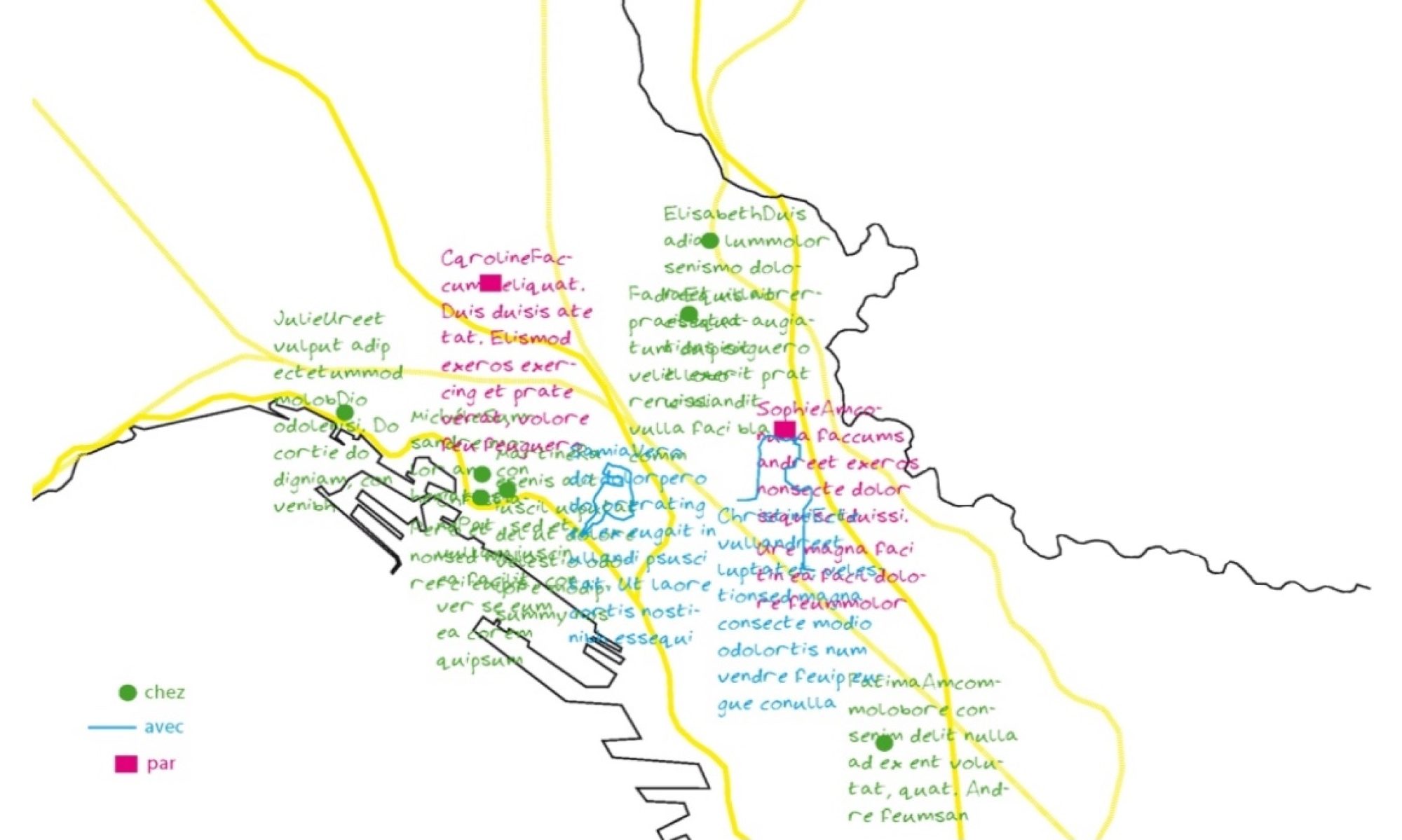On January 19, 2016, North Hotel celebrates its 5 years of existence as a "cooperative of inhabitants". Our cooperative process was born long before, with the integrated European Heritage mission between 1995 and 2013, the Heritage Commission 15/16 active from 2009 and a first pilot residence prototype launched in 2010 before adopting the status of cooperative. Five years later, our Co-op has more than 60 members and has contributed to the reception of around 10,000 passengers who came to Marseille by its north. A detailed review will be published as per year following our General Assembly in April 2015. At the economic level, North Hotel must face like so many others to the formidable new competition of the platforms of the collaborative economy, in our case AirBnB to name only the most visible with already a thousand beds available in the Northern Districts of Marseille (7th and 8th sectors). Hotel du Nord has embarked with others for a year in a process of creating a cooperative platform of hospitality on an international scale called for the moment "H2H": from Human to human, from history to stories, from host to hosts. Why embark on the creation of a new co-operative platform on an international scale? What would she be so innovative that would be worth the adventure? Is this not a leak in front coupled with a fascination for the Internet tool? The debate is open in our Co-op and with our partners. The positioning of these platforms is always the same: a direct exchange of person to person C2C, access to a low rate offer (central argument), a system of reputation of the hosts (notation, notice, certification, etc.) without forgetting a marketing speech Centered on the promise of a meeting of a "resident". A tour of the many "alternative" internet platforms in AirBnB makes it possible to understand that they essentially seek to differentiate themselves by specialising in a typology of users: professionals, gays, families with children, rich, etc, and in a Lesser extent on a timid widening of the proposed ancillary services: good places nearby, training offers or visits with its host, etc. in fine, the main value is that of earning the agent easily for the host that hosts ("Change Living, earning money by welcoming ") and the cheapest fare for the Traveller (" twice as much as a hotel "). The hosting services offered via the C2C platforms seem to be the most competitive, as on the C2C platforms positioned on transport, visits, home catering, etc. This competitive rate is achieved by an optimized competition between hosts thanks to an individualisation of hosts which accentuates free competition; A minimum reduction of their solidarity contributions and their rights: minimizing common rights (Labour Code, etc.), social contributions (taxation, social charges, etc.), collective organizations (unions, etc.) with in Fine a majority of hosts without status or self-contractor. Then an exponential expansion of the offer thanks to the possibility offered to all to exercise without being professional: it would suffice to have a sofa to accommodate, a kitchen to cook, a car to transport, etc. (the end of the trades). In fine an optimized competition thanks to the web with an instantaneous and efficient comparison of rates, location, reputation and service. Only the platforms themselves are excluded from this competition through the acquisition of a quasi-monopoly position to impose large margins (and attract the interest of pension funds), to be able to exclude their undesirable members (criticism of the Platform, bad reputation), create a favorable power relationship with the public authorities, optimise their taxation and change the regulations in their favour (lobbying). This logic meets its own limits with today for example 20% of the Parisian accommodation of AirBnB which are the offer of professionals going up to propose a hundred apartments, see hoteliers as in Switzerland. This information, not provided by AirBnB, see contradictions, is the result of increasingly numerous activists to set up systems of vigilance and information vis-à-vis these platforms. In Barcelona, where the new mayor campaigned against mass tourism in his city, the city just launched in December disciplinary proceedings against the two platforms AirBnB and HomeAway for proposing "tourist apartments not "Have not responded to the requests of the administration". AirBnB has already announced its intention to appeal. For all that, AirBnB arrives to impose its choices by spending for example 8 million million last year in the city of San Francisco only to fail, successfully, a referendum that proposed to the inhabitants to frame much more strictly its Activity in the face of increased rents and evictions. Its ambition is to become the first global player in tourism from 2017 and it gives the means. In the United States, where these platforms are more active and established, the debate is becoming very lively. The start up of Silicon Valley is called the "star of Death platform" so they are formidable at all levels, going so far as to declare the state out of play (only the users count) and that no economic sector will be spared! "The Alliance" in the face of the "sharing economy" is organized with the end of 2015 a thousand people who met in New York to launch the foundations of a credible alternative through the "cooperatives platforms". At European level, the European Committee of the Regions has submitted to the European Commission and submits to each Member State a report dated 5 December 2015 on "the local and regional dimension of the sharing economy". This report, rich in its analysis of the context, its findings and its proposals, particularly encourages the European Commission and the Member States to put in place incentives for the collaborative economy in order to support and apply the Principles of the social economy (in particular with regard to the principles of solidarity, democracy and participation, as well as cooperation with the local community). Europe seems to want to not get caught up in speed again by the giants of the Web. Following these findings and in this context, is it possible to develop a credible cooperative alternative? How would our H2H proposal be different and more relevant than the existing platforms? Is it worth the effort to invest time and money in such an adventure? Does it only better frame these giants and do with it? Is it possible to exist economically in the face of the economic logic of the low price imposed by these platforms? Are we doomed to a niche strategy? Faced with this formidable economic logic and its proven effectiveness, we decided to make what would be a priori our weaknesses, our strengths! Where they put the individual alone, we put the common in the plural and at the centre of our activity. We are an offer of hospitality. It is the "heritage communities" within the meaning of Faro, which welcome. Communities that take care of the common, of themselves and of others. We do not offer C2C-consumer to consumer-but H2H-host to hosts, human to human, history to stories. We confirm our commitment to human rights as to democracy and the rule of law as well as to cooperative principles. The Declaration of the International Cooperative Alliance remains our economic reference and the Faro Convention on the right to cultural heritage our European framework. Who are these communities within H2H? They are plural, small and large, self-organized and self-established, producers of general interest and composed of hosts. It is today a network of hotels in rural areas that take care of villages and their communities, a cooperative of host inhabitants who defends its heritage environment in a changing metropolis, a network of hostels, a Cooperative of artisans concerned with the work well done and to pass on its know-how, a travel agency defending the "holidays for all" and a national network of entrepreneurs "producers of general interest". Not to mention the other communities in Europe, the Mediterranean and recently in America who follow us and will certainly join us if we pass the national Cape. Why would a passenger use this platform? Will it be confidential and reserved for the only savvy? The platform we want to put in place aims in the first place to offer the same quality of use as the current ones, see better as the Internet allows. We propose to move from a "one to one" reception with a host who shares with his community only the same platform to a reception by a local "community" existing well before the platform and owner of it. The question of the "reputation" of the host and its "notation" logics increasingly diverted is no longer necessary. The host is a welcoming party of a community that recognizes the quality of its commitment and its offer of hospitality as common know-how (trades). This will not prevent the collection and publication of the opinion of the passengers as on the North Hotel. The host, alone or in a group, has common interests to share with its passengers as their common history, their knowledge and know-how, etc. From 2016, the North Hotel will set up on its pilot platform an experience of taguage of these offers of hospitality and cultural contents so that for example a person sharing our interest in the industrial history of the north of Marseille can Quickly identify how to share this interest through the meeting of hosts, places, works, products, images, archives, artistic creations. Some host communities pay special attention to particular passengers such as commuting workers, migrants, students, families, etc. and offer them specific hospitality offers such as the already Hotel du North in cooperation with the North Hospital (accommodation of relatives of hospitalized persons), businesses and hikers of the GR2013. The community is also an opportunity to benefit from a diverse offer of hospitality and heritage discovery in terms of accommodation, strolls, local products and works as is already the case with Hotel du Nord but which via the founders of H2H Already widens to the know-how (learned with) and the sharing of cultural data. Finally they pool what makes their quality of life and their living environment through the sharing of "good places" where the community goes, the cultural activities it recommends or the spaces it frequents. By putting the common in the centre of the H2H project, we return to the basis of our respective approaches while being positively marked for our passengers of the classic C2C offers. This is the economic bet we want to take by launching H2H. The reading of the media also shows that for some the cooperative status of its democratic and non-profit nature (moderate capital remuneration) would not be compatible with the development of a C2C platform which requires a significant lifting of Financial funds, except may be to entrust the task to "social entrepreneurs" ignoring the cooperative principles. It is first of all to make few cases of the "cooperative giants" present in all economic sectors and which have been highlighted during the International Year of cooperatives. It is also forgetting the plasticity of the cooperative principles that have enabled them to adapt this status to social challenges (cooperatives of sinners, activities, etc.). The paradox seems to us more on the side of the C2C platforms which think that they can in the long term combine collaboration and individualism, sharing and refusal of the Commons, hospitality and surveillance, reciprocity and competition (we are both producer and Consumer). After launching a first prototype platform in Marseille in 2010 with Hoteldunord.coop, having contributed to the emergence of a second prototype with the application "hidden City" in Pilsen in 2015, we launch our third prototype this year with the Version Poitou Charente of HôtelduNord. Coop and create in January the cooperative structure that will carry H2H. Our goal is to launch the National cooperative platform in 2017 and the international one in 2018. The discussion on this article is open through the comments;

